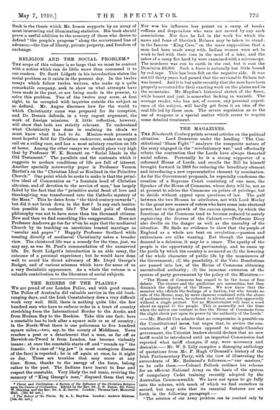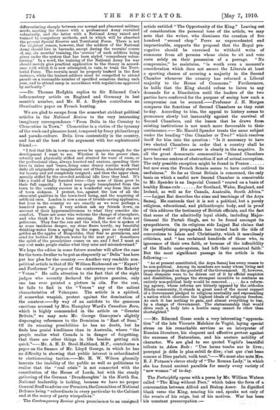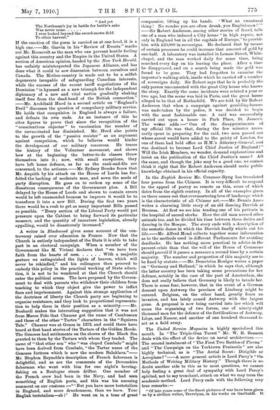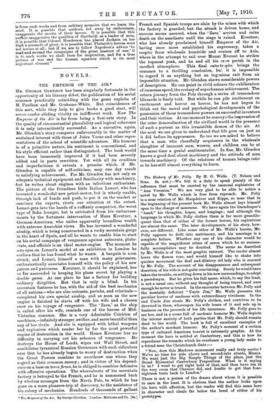THE MAGAZINES.
THE Nineteenth Century prints several articles on the political situation. Lord Dunraven under the heading " The Con- stitutional ' Sham Fight' " analyses the composite nature of the army engaged in the "revolutionary war," and effectually
rebuts the contention that the Lords have always thwarted' social reform. Personally he is a strong supporter of a reformed House of Lords, and recalls the Bill he himself brought forward in 1888 for reducing the hereditary element and introducing a new representative element by nomination. As for the Government proposals, he especially condemns the creation of a Supreme Court consisting of one man, the Speaker of the House of Commons, whose duty will be, not as at present to advise the Commons on points of privilege, but to decide without appeal upon questions of law. The gulf between the two Houses he attributes, not with Lord Morley to the great new masses of voters who have come into electoral power, but to the growth of the caucus system, by which the functions of the Commons tend to become reduced to merely registering the decrees of the Cabinet.—Professor Dicey also dwells on the danger as well as the unreality of the situation. He finds no evidence to show that the people of England as a whole are bent on revolution,—passion and enthusiasm are alike wanting. But though the imagined demand is a delusion, it may be a snare. The apathy of the people is the opportunity of partisanship, and he sums up the perils by which the country is menaced as (1) the lowering of the whole character of public life by the manoeuvres of the Government; (2) the possibility, if the Veto Resolutions are passed into law, of the House of Commons obtaining uncontrolled authority ; (3) the immense extension of the system of party government by the policy of the Ministers:—
" The House of Commons has ceased to be the home of free debate. The closure and the guillotine are necessities, but they diminish the dignity of the House. We now know that the member who offends the feelings of a faction, but who breaks no rule of the House, may, by mere clamour combined with the abuse of parliamentary forms, be reduced to silence, and this apparently without a single protest. Yet no Ministerialist will hear a word about an appeal to the people. This is assuredly not the time when the nation can venture to free the House of Commons from the slight check put upon its power by the authority of the Lords.' —Mr. Harold Cox admits that no compromise is possible on the Constitutional issue, but urges that, to secure the con- centration of all the forces opposed to single-Chamber government, the Unionist leaders should declare that no new tariff would be introduced until an impartial Commission bad reported what tariff changes, if any, were necessary and desirable.— Mr. W. S. Lilly compiles a damaging anthology of quotations from Mr. F. Hugh O'Donnell's history of the Irish Parliamentary Party, with the view of illustrating the antecedents of Mr. Redmond's followers,—" our masters," as be calls them.—Colonel Pollock outlines his scheme for an efficient National Army on the basis of the system of compulsory Cadet training recently adopted by the Australian Commonwealth. We have not space to go fully into the scheme, with much of which we find ourselves in accord, but may note that its essential features are set forth in the following paragraph :- "The solution of our Army problem can be reached only by
differentiating sharply between our normal and abnormal military needs, meeting the former with a professional Army recruited voluntarily, and the latter with a National Army raised and trained by compulsory methods, and in which will be absorbed the present Special Reserve and Territorial Force. There is not the slightest reason, however, that the soldiers of the National Army should live in barracks, except during the recruits' course of, say, six months' training, the service ' of such soldiers being given under the system that has been styled compulsory volun- teering.' In a word, the training of the National Army for war should merely give practical application to the theory in accord- ance with which it is now attempted, in vain, to train the Terri- torial Force. The recruits must be properly trained in the first instance, while the trained soldiers must be compelled to attend parade on a reasonable number of specified occasions during each year, and to attend camp in accordance with regulations approved by authority."
—Dr. Thomas Hodgkin replies to Sir Edmund Cox's inflammatory article on England and Germany in last month's number, and Mr. H. A. Bryden contributes an illuminative paper on French hunting.
We are glad to escape from the somewhat strident political -articles in the National Review to the very interesting imaginary correspondence " From Delia in the Country to Clementine in Town." Clementine is a victim of the tyranny of the week-end pleasure-hunt, tempered by fussy philanthropy and pseudo-culture. Delia lives contentedly in the country, and has all the best of the argument with her sophisticated friend:— "I feel that life in towns can never be spacious enough for the development I want to see. Whether it be the poorer class, actually and physically stifled and stunted for want of room, or the professional class, always hurried and anxious, spending their lives in tgbes and 'buses, doing some dreary routine work that dulls all originality or imagination out of them, absolutely starved for beauty and yet completely resigned; and then the upper class, morally stifled by the crowded artificial idle lives they lead. It's like a world of badly forested trees—they none of them grow to their full capacity. I have seen people transplanted from the town to the country recover in a wonderful way from this sort of town sickness. I protest, too, against the loss of all the .elemental qualities in the town-bred being, and the acquiring of artificial ones. London is now a mass of trouble-saving appliances, but here in the country we are exactly as we were perhaps a hundred years ago. I very seldom ask my friends down, on account of their hypersensitiveness to what they consider dis- comfort. There are some who welcome the change of atmosphere, and who think it for a time amusing. But most of them are poltroons. They fear the sun and the wind, the dew is spoken of .as some insidious danger, my stone floors terrify, my beautiful drinking-water from a spring in the copse, pure as crystal and golden as the apples of Hesperides, they fear as germinous, and .send for bottles of Malvern water by the next post! Sometimes the spirit of the proselytiser comes on me, and I feel I must at any cost make people realise what they miss and misunderstand." We hope the editor in some future number will allow the case for the town-dweller to be put as eloquently as " Delia" has here plat her plea for the country.—Another very readable non- political article is that of Sir William Richmond on " 'Expert ' and Performer" a propos of the controversy over the Rokeby " Venus." He calls attention to the fact that of the eight judges who recently declared the picture genuine, only one has ever painted a picture in oils. For the rest, he fails to find in the " Venus " any of the salient characteristics of Velazquez. The article is a spirited, if somewhat waspish, protest against the domination of the amateur.—By way of an antidote to the generous emotions aroused by Mrs. Humphry Ward's Canadian Born, which is highly commended in the article on " Greater Britain," we may note Mr. George Gascoyne's slightly disparaging references to the Dominion in " East of Suez." Of its amazing possibilities he has no doubt, but he finds less genial kindliness than in Australia, where " the people realise what Canada is in danger of forgetting, that there are other things in life besides getting rich quick."—Mr. A. H. D. Steel-Maitland, M.P., contributes a paper on the finance of Mr. Lloyd George, in which be has no difficulty in showing that public interest is subordinated to electioneering tactics.—Mr. H. W. Wilson gloomily laments the inability of the public as well as politicians to realise that the "real crisis" is not connected with the constitution of the House of Lords, but with the steady gathering of the German Dreadnoughts' in the North Sea. .National leadership is lacking, because we have no proper , General Staff to advise our Premiers, the Committee of National ._Defence being " subordinate in every particular to the Cabinet and at the mercy of party wirepullers."
=
The Contemporary Review gives prominence to an unsigned article entitled " The Opportunity of the King." Leaving out of consideration the personal tone of the article, we may
note that the writer, who dismisses the creation of five hundred " second chop " Peers as unprecedented and impracticable, supports the proposal that the Royal pre- rogative should be exercised to withhold writs of summons from all persons whose claim to sit and vote rests solely on their possession of a peerage. " No compromise," he maintains, is worth even a moment's consideration which does not secure the Liberals at least a sporting chance of securing a majority in the Second Chamber whenever the country has returned a Liberal majority to the House of Commons." Furthermore, he holds that the King should refuse to listen to any demands for a Dissolution until the leaders of the two
parties have conferred for the purpose of seeing how such a compromise can be secured.—Professor J. H. Morgan
compares the functions of Second Chambers as they exist to-day. According to him, the appeal to history seems to pronounce slowly but inexorably against the survival of Second Chambers, and the lesson that he draws from existing institutions is not much more favourable to their continuance.— Mr. Harold Spender treats the same subject under the heading " One Chamber or Two ? " which resolves itself for him into the question : " Is it necessary to have two elected Chambers in order that a country shall be governed well ? " His answer is clearly in the negative. In all the great democratic communities " Second Chambers have become centres of obstruction if not of actual corruption The only possible exception might be found in France but now even the French Senate seems to have outlived its usefulness." So far as Great Britain is concerned, the only basis on which a useful new Second Chamber is conceivable to Mr. Spender is an Imperial Council "reared on a basis of healthy Home-rule . . . . . . for Scotland, Wales, England, and Ireland, as well as for Canada, Australia, South Africa." Lajpat Rai describes the aims and teachings of the Arya Samaj. He contends that it is not a political, but a purely religious, educational, and philanthropic body, and in proof of this adduces the testimony of British officials, and the fact that some of the admittedly loyal chiefs, including Major- General Sir Partab Singh, are to be found amongst its sympathisers. On its religious side Lajpat Rai claims that its proselytising propaganda has turned back the tide of conversions to Islam and Christianity, • which it mercilessly criticises, and " has reclaimed hundreds of those who, in ignorance of their own faith, or because of the inflexibility of the Hindu caste-system, had left their ancestral faith." But the most significant passage in the article is the following :—
" As at present constituted, the Arya Samaj has every reason to be non-political. Among its members are many whose living and prospects depend on the goodwill of the Government. If, however, these elements were to be driven out of it by official suspicion and disabilities, perhaps the strongest incentive to continue an entirely non-political body would be removed As a reform- ing agency, whose reforms are bitterly opposed by the orthodox Hindu community, it stands in great need of the moral support of a Government pledged to religious neutrality and representing a nation which cherishes the highest ideals of religious freedom. As such it has nothing to gain, and almost everything to lose, by a change of Government. The statesmanship that would drive such a body into a hostile camp cannot be other than shortsighted."
—Mr. Edmund Gosse sends a very interesting "apprecia- tion " of the late Vicomte Melchior de Vogue, laying special stress on his remarkable services as an interpreter of Russian literature, his eloquent and effective protest against the excesses of Naturalism, and his austere nobility of
character. We are glad to see quoted Vogue's . beautiful tribute to Adam Bede : " Une larme tombs sur Is livre ; pourquoi je defie le plus subtil de dire ; c'est que c'est beau comme si Dieu parlait, voilI tout."—We must also note Mrs. E. J. Putnam's clever study of "The Roman Lady," in which she has found: ancient parallels for nearly every variety of "new woman " of to-day.
The Fortnightly opens with a poem by Mr. William Watson called " The King without Peer," which takes the form of a
conversation between Alfred and Bishop Asser. In dignified blank verse the King, nearing his end, speaks not only of
the events of his reign, but of his motives. War has been his 'constant preoccupation :—
" And yet The Northman's joy in battle for battle's sake Was never mine I ever looked beyond the sword-mown field To other harvest."
If the emotion of the poem is carried on at one level, it is a high one.—Mr. Garvin in his "Review of Events" marks out Mr. Roosevelt as the man who can prevent hostile feeling against this country and the Empire in the United States. A section of American opinion, headed by the New York Herald, has unfairly misinterpreted the Japanese Alliance, and has done what it could to sow dissension between ourselves and Canada. The Mother-country is made out to be a selfish degenerate incapable of safeguarding Canadian interests, while the success of the recent tariff negotiations of the Dominion " is hymned as a new triumph for the independent diplomacy of a new and vital nation gradually shaking itself free from the dead-hand of the British connection."
—Mr. Archibald Hurd in a second article on "England's Peril" discusses the question of compulsory military service. He holds that compulsion in England is always a failure, and defeats its own ends. As an instance of this he cites figures to prove that since the recognition of the " conscientious objector " to vaccination the number of the unvaccinated has diminished. Mr. Hurd also points
to the growth of the "passive resister" as an argument against compulsion, which he believes would hinder
the development of our military resources. He traces the history of the Volunteer movement, and shows how at the beginning the better-to-do classes threw themselves into it ; now, with small exceptions, they have left home defence, as far as the rank-and-file are concerned, to the artisans.—Mr. Sydney Brooks fears that Mr. Asquith by his attack on the House of Lords has for- feited the backing of moderate men, and sown the seeds of party disruption. He goes on to reckon up some of the disastrous consequences of the Government plan. A Bill delayed by the House of Lords and shown to contain errors would be left unamended because to improve it would be to transform it into a new Bill. During the first two years there would be a rush to get as many important Bills passed as possible. "Every section of the Liberal Party would put pressure upon the Cabinet to bring forward its particular measure, and the quantity of immature legislation, already appalling, would be disastrously increased."
A writer in Blackwood gives some account of the con- troversy raised over education in France. Now that the Church is entirely independent of the State it is able to take part in an electoral campaign. When a member of the Government like M. Viviani declares that " we have torn faith from the hearts of men With a majestic gesture we extinguished the lights of heaven, which will never be rekindled," and his colleagues then proceed to embody this policy hi the practical working of State educa- tion, it is not to be wondered at that the Church should enter the political arena. The laws proposed by the Govern. ment to deal with parents who withdraw their children from teaching to which they object give the power to inflict fines and imprisonment. Against this strange application of the doctrines of liberty the Church party are beginning to organise resistance, and they look to proportional representa- tion to help them in their position as a minority.—Mr.
Bushnell makes the interesting suggestion that it was not from Marco Polo that Chaucer got the name of Cambuscan and those of the other " Tartre " characters in the " Squiere,s Tale." Chaucer was at Genoa in 1373, and could there have heard at first hand stories of the Tartars of the Golden Horde. The Genoese had settlements on the shores of the Black Sea granted to them by the Tartars with whom they traded. The name of " that other son " who " was cleped Cambalo" might have been derived from Cembalo, " the Tartar name of the Genoese fortress which is now the modern Balaklava."— Mr. Stephen Reynolds's description of French fishermen is delightful, and so are the comments of the Devonshire fisherman who went with him for one night's herring- fishing on a Boulogne steam drifter. One member of the French crew had been in the Navy, and had seen something of English ports, and this was his amusing comment on our customs :—" But you have more teetotalism in England, and more drunkenness, than we have. Your English teetotalism--ah He went on in a tone of great compassion, lifting up his hands. What an unnatural thing ! No wonder you are often drunk, you Englishmen ! ' " —Sir Robert Anderson, among other stories of fraud, tells one of a man who induced a City house " in high repute, not only in England but in all the capitals of Europe," to provide him with £20,000 in sovereigns. He declared that by means of certain processes he could increase that amount of gold by one-half. A laboratory was installed in Leman Street, White- chapel, and the man worked daily for some time, being searched every day on his leaving the place. After a time he disappeared, and on a search being made the gold was found to be gone. They had forgotten to examine the impostor's walking-stick, inside which he carried off a number of sovereigns daily. Sir Robert says that he is probably the• only person unconnected with the great City house who knows the story. Exactly the same incidents were related a year or two ago, but the scene was laid in Paris, and the great house alleged to be that of Rothschild. We are told by Sir Robert Anderson that when a campaign against gambling-houses was undertaken by the police, it was decided to begin with the most fashionable one. A raid was successfully carried out upon a house in Park Place, St. James's. The writer adds :—" One of the disappointments of my official life was that, during the few minutes neces- sarily spent in preparing for the raid, two men passed out. whose arrest would have added to the gaiety of London, for one of them had held office as H.M.'s Attorney-General, and was destined to become Lord Chief Justice of England !' Will the Irish Members, we wonder, demand explanations and insist on the publication of the Chief Justice's name ? All the same, and though the joke may be a good one, we cannot, think it right that Sir Robert Anderson should make public knowledge obtained in his official capacity.
In the English Review Mr. Craiuner-Byng has translated four poems from the Chinese. It is very difficult to respond to the appeal of poetry so remote as this, some of which dates from the eighth century. In all of the examples given us there comes out that overmastering love of landscape which is the characteristic of all Chinese art.—Mr. Dennis Ames writes a charming little story of an old dancing Dervish at Broussa. At first we see him tending one of his patients in the hospital of sacred storks. Here the old man nursed other animals too, and he divided his time between these duties and dancing in the Mosque. The story ends with a description of the ecstatic dance in which the Dervish finally whirls out his life.—Mr. Alfred Mond collects together some information as to the methods used in different Parliaments for avoiding deadlocks. He has nothing more practical to advise in the present crisis than that the will of the House of Commons should prevail if it passes a measure a second time by a certain majority. The number and proportion of this majority are to.
be fixed by statute.—Mr. Demetrius Boulger writes a paper on " Germany and Holland," in which he says that, although the latter country has been taking some precautions for her defence, notably in the case of the port of Amsterdam, she does not really believe that Germany is likely to invade her.
There is some fear, however, that in the event of a German descent upon Antwerp the province of Limburg might be entered. Belgium, on the other hand, greatly fears an invasion, and has lately armed Antwerp with the largest guns. A proposal is now being carried into law which will mean the organising of two forces, one of ninety-eight thousand men for the defence of the fortifications of Antwerp, Liege, and Namur, and another of one hundred thousand to act as a field army.
The United Service Magazine is highly specialised this month. In " The Triple-Gun Turret " Mr. W. R. Bennett deals with the effect of the device on naval architecture.— The second instalment of " The First Two Battles of Plevna " and "The Campaign on the Yorktown Peninsula" are also highly technical, as is " The Aerial Scout: Dirigible or Aeroplane ? "—A more general article is Lord Percy's " On • Methods of Writing Military History." Though there is no doubt another side to this as to most questions, we cannot help feeling a great deal of sympathy with Lord Percy's spirited, not to say trenchant, attack on what we may term the academic method. Lord Percy ends with the following very true remarks:— " Of late years some of the finest pictures of war have been gives us by a civilian writer, Trevelyan, in his works on Garibaldi. It
is from such works and from military memoirs that we learn the most. It is possible that authors, led away by enthusiasm, exaggerate the merits of their heroes. It is possible that this author exaggerates the qualities of Garibaldi as a leader of men, it is possible that Colonel Henderson has placed Jackson on too high a pinnacle of glory, it is possible that Plutarch'e heroes were not heroes at all ; but if we are to follow Napoleon's advice 'to read and re-read the campaigns of the great masters of war,' it is to such works we shall turn for inspiration, and for a true picture of war and the human equation which is its most important element."













































 Previous page
Previous page